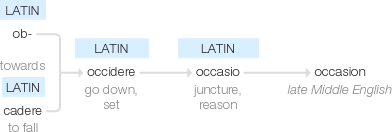Occasion
late Middle English: from Latin occasio(n- ) ‘juncture, reason’, from occidere ‘go down, set’, from ob- ‘towards’ + cadere ‘to fall’.
wiktionary
Borrowed from Middle French occasion, from Old French occasiun, from Latin occasionem (accusative of occasio), noun of action from perfect passive participle occasus, from verb occido, from prefix ob-(“down", "away”) + verb cado(“fall”).
etymonline
occasion (n.)
late 14c., occasioun, "opportunity; grounds for action or feeling; state of affairs that makes something else possible; a happening, occurrence leading to some result," from Old French ochaison, ocasion "cause, reason, excuse, pretext; opportunity" (13c.) or directly from Latin occasionem (nominative occasio) "opportunity, appropriate time," in Late Latin "cause," from occasum, occasus, past participle of occidere "fall down, go down," from ob "down, away" (see ob-) + -cidere, combining form of cadere "to fall" (from PIE root *kad- "to fall"). The notion is of a "falling together," or juncture, of circumstances. The sense of "the time or a time at which something happens" is from 1560s.
occasion (v.)
mid-15c., occasionen, "to bring (something) about, be the cause of (something)," from occasion (n.), or else from Old French occasionner "to cause," from Medieval Latin occasionare, from Latin occasionem (see occasion (n.)). Related: Occasioned; occasioning.
